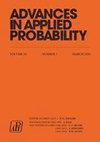Predicting the last zero before an exponential time of a spectrally negative Lévy process
IF 1.2
4区 数学
Q3 STATISTICS & PROBABILITY
引用次数: 0
Abstract
Abstract Given a spectrally negative Lévy process, we predict, in an $L_1$ sense, the last passage time of the process below zero before an independent exponential time. This optimal prediction problem generalises [2], where the infinite-horizon problem is solved. Using a similar argument as that in [24], we show that this optimal prediction problem is equivalent to solving an optimal prediction problem in a finite-horizon setting. Surprisingly (unlike the infinite-horizon problem), an optimal stopping time is based on a curve that is killed at the moment the mean of the exponential time is reached. That is, an optimal stopping time is the first time the process crosses above a non-negative, continuous, and non-increasing curve depending on time. This curve and the value function are characterised as a solution of a system of nonlinear integral equations which can be understood as a generalisation of the free boundary equations (see e.g. [21, Chapter IV.14.1]) in the presence of jumps. As an example, we numerically calculate this curve in the Brownian motion case and for a compound Poisson process with exponential-sized jumps perturbed by a Brownian motion.预测光谱负lsamvy过程的指数时间之前的最后一个零
摘要给定一个谱负Lévy过程,我们在$L_1$意义上预测了该过程在独立指数时间之前的最后一次通过时间。这个最优预测问题推广了[2],其中解决了无限视界问题。使用与[24]中类似的论点,我们证明了这个最优预测问题等价于在有限时域设置中求解最优预测问题。令人惊讶的是(与无限地平线问题不同),最佳停止时间是基于在达到指数时间平均值时终止的曲线。也就是说,最佳停止时间是过程第一次越过取决于时间的非负、连续和非增加曲线。该曲线和值函数被描述为非线性积分方程组的解,该方程组可以被理解为存在跳跃的自由边界方程的推广(例如参见[21,第IV.14.1]章)。作为一个例子,我们在布朗运动的情况下,以及在布朗运动扰动下具有指数大小跳跃的复合泊松过程中,数值计算了这条曲线。
本文章由计算机程序翻译,如有差异,请以英文原文为准。
求助全文
约1分钟内获得全文
求助全文
来源期刊

Advances in Applied Probability
数学-统计学与概率论
CiteScore
2.00
自引率
0.00%
发文量
64
审稿时长
6-12 weeks
期刊介绍:
The Advances in Applied Probability has been published by the Applied Probability Trust for over four decades, and is a companion publication to the Journal of Applied Probability. It contains mathematical and scientific papers of interest to applied probabilists, with emphasis on applications in a broad spectrum of disciplines, including the biosciences, operations research, telecommunications, computer science, engineering, epidemiology, financial mathematics, the physical and social sciences, and any field where stochastic modeling is used.
A submission to Applied Probability represents a submission that may, at the Editor-in-Chief’s discretion, appear in either the Journal of Applied Probability or the Advances in Applied Probability. Typically, shorter papers appear in the Journal, with longer contributions appearing in the Advances.
 求助内容:
求助内容: 应助结果提醒方式:
应助结果提醒方式:


